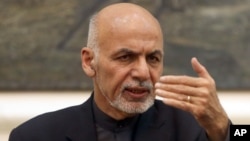China's military chief General Fang Fenghui is in the Afghan capital, Kabul, talking to the Afghan leadership about a four-nation regional alliance against terrorism.
China's proposed anti-terror plan includes China, Pakistan, Afghanistan and Tajikistan. The three countries in the proposed alliance share borders with the western regions of China, where anti-Beijing sentiment is prevalent in the Muslim Uighur ethnic group.
The Turkic ethnic group living in Xinjiang province has been looking since the early 1990s for greater political and religious autonomy. Pakistan, Afghanistan and Tajikistan to some extent have been plagued by religious militancy for decades.
Chinese Uighurs are believed to be operating inside China from the Pakistan-Afghanistan border areas.
Speaking to VOA, Sayed Zafar Hashemi — deputy spokesman for President Ashraf Ghani — said the Chinese military chief asked for Afghanistan's participation in the Chinese-proposed anti-terrorism mechanism with Pakistan and Tajikistan. "President Ghani has endorsed the proposal," he said.
Hashemi added that Ghani told Fang that no distinction should be made between "good and bad terrorists."
Afghanistan has long accused Pakistan of targeting only those who are involved in terrorist activities inside Pakistan, and turning a blind eye to those operating out of Pakistan and fighting inside Afghanistan.
Pakistan denies these claims and points to terrorism activities with alleged roots to groups inside Afghanistan.
US reaction
In response to a question by VOA, a spokesperson for the State Department said the United States would support any role that China or other nations can play in bringing long-term stability to Afghanistan.
"China's a neighbor, and they have an interest in a strong, stable, terrorism-free Afghanistan,” the spokesperson said. “And so we certainly — I mean, I'm not in a position to comment specifically about this proposal, since, as I understand it, it's just recently been set forth. And I understand President Ghani had some positive things to say about it. Again, we'd welcome any effort by the international community and members of the international community that would lead to a strong, prosperous, stable Afghanistan in the future. "
New mechanism
Not many details have been revealed about the new anti-terrorism mechanism.
The four countries are concerned about the existence and spread of terrorism in the region. The concerns are further exacerbated by the withdrawal of international combat forces from Afghanistan.
Afghan political analyst Matiullah Abbasin sees the security situation in the Chinese province of Xinjiang as the main reason behind China's push for a regional anti-terror alliance.
"Taliban is not the only concern in Afghanistan. We [also] have ISIS, and their target is Central Asia,” Abbasin said, using an acronym for Islamic State. “This worries China, and that's the reason they are trying to combat terrorism at the regional level."
Peace negotiations with Afghan insurgent groups are expected to resume sometime this week in the Pakistani capital of Islamabad. The U.S., China, Afghanistan and Pakistan are part of the peace negotiations.




